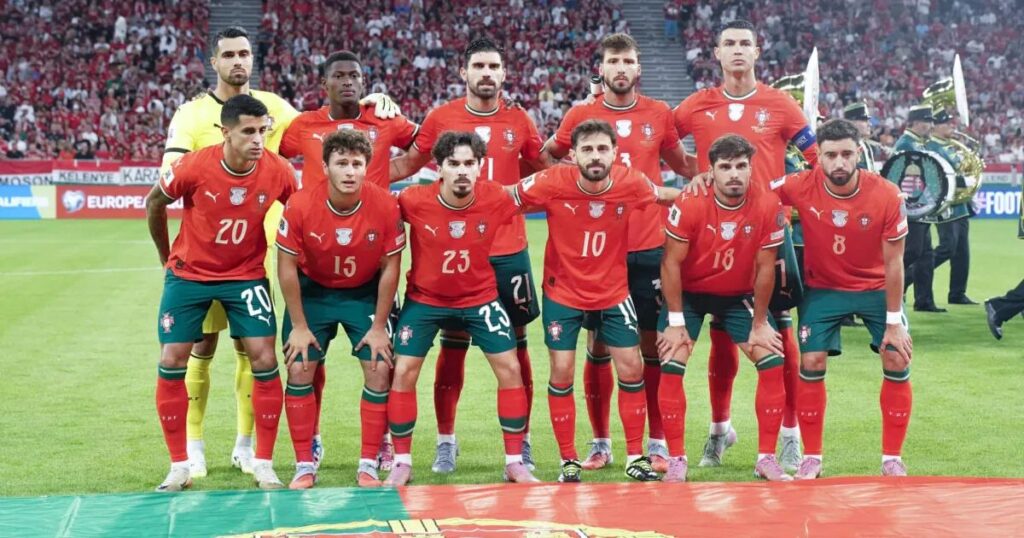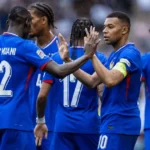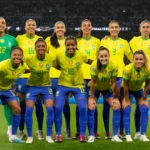If you’ve ever felt the electric buzz of a packed stadium chanting “Portugal! Portugal!” or witnessed the sheer magic of a Cristiano Ronaldo free-kick bending into the top corner, you know the Portugal national football team games aren’t just matches—they’re spectacles of skill, heart, and unyielding spirit. The Seleção das Quinas, as they’re affectionately known, has evolved from underdogs to one of Europe’s elite forces, captivating fans with their blend of flair and grit. Whether you’re a die-hard supporter tracking the Portugal next match or a casual viewer tuning in for the drama, this deep dive into the team’s history, triumphs, and what’s ahead will have you laced up and ready for the next kickoff.
Football in Portugal isn’t merely a sport; it’s woven into the fabric of national identity. From sun-soaked coastal pitches to the roaring echoes of Estádio da Luz, the Portugal football team embodies resilience, much like the nation’s seafaring explorers of old. In this article, we’ll journey through their storied past, dissect their tactical wizardry, spotlight the stars who light up the pitch, and gaze into a future brimming with potential. Buckle up—it’s time to celebrate the beautiful game, Portuguese style.
The Rich History of the Portugal Football Team: From Humble Beginnings to Global Contenders
The tale of the Portugal football team begins in the early 20th century, a time when the sport was still finding its footing in a country more renowned for its ports than its pitches. The Portuguese Football Federation (FPF) was established in 1914, but World War I delayed organized international play until 1921. Portugal’s debut came against Spain in a 3-1 loss, setting the tone for decades of passionate but often frustrating campaigns.
Early years were marked by inconsistency. Portugal qualified for just two of the first 16 FIFA World Cups, their first appearance in 1966 proving a watershed moment. Under coach Otto Glória, the team stunned the world by finishing third, powered by the legendary Eusébio da Silva Ferreira—the “Black Panther.” Eusébio’s nine goals, including a hat-trick against North Korea, earned him the Golden Boot and etched Portugal into football folklore. That semi-final heartbreak against England only fueled the fire for future generations.
The 1980s and ’90s brought sporadic highs, like a quarter-final run at Euro 1984, but also painful misses, including four straight World Cup failures. Enter the “Golden Generation” of the mid-1990s: a youth revolution sparked by two FIFA U-20 World Cup wins in 1989 and 1991. Talents like Luís Figo, Rui Costa, and João Pinto transitioned seamlessly to the senior side, injecting creativity and swagger. Hosting Euro 2004 as underdogs, Portugal reached the final but fell 1-0 to Greece in one of football’s greatest upsets. Yet, that tournament showcased their potential, with a young Cristiano Ronaldo emerging as a tearful, determined 19-year-old.
The 2000s solidified Portugal’s status. Semi-finals at Euro 2000 and 2012, a fourth-place finish at the 2006 World Cup—these were building blocks. But it was the 2010s that transformed promise into silverware. Under Fernando Santos, Portugal adopted a pragmatic edge, blending defensive steel with counter-attacking verve. The Portugal FIFA ranking climbed steadily, reflecting their ascent from mid-table Europeans to perennial threats.
Today, the Portugal football team stands as a testament to evolution. From Eusébio’s explosive runs to Ronaldo’s precision, their history is a mosaic of triumphs born from adversity. It’s a narrative that resonates with fans, reminding us that every great team has its defining chapters.
Major Achievements: Trophies, Milestones, and Unforgettable Moments
No discussion of the Portugal national football team games is complete without toasting their glittering cabinet. While not the most decorated side, Portugal’s achievements punch above their weight, marked by resilience and clutch performances.
The crown jewel? Victory at UEFA Euro 2016. In a tournament defined by grit over glamour, Portugal topped a tough group before scraping through knockouts via Éder’s extra-time stunner against host France in the final. It was redemption for the 2004 heartbreak, igniting nationwide euphoria. Ronaldo, injured early in the final, coached from the sidelines—a viral image of leadership.
Adding to the haul, Portugal lifted the inaugural UEFA Nations League in 2019, edging the Netherlands 1-0 in the final thanks to Guedes’ late strike. They doubled down in 2025, defeating Spain on penalties in Munich for their third major title. The 2017 FIFA Confederations Cup win, Ronaldo’s last with a young squad, rounded out a golden era.
World Cup highlights include that 1966 bronze and a 2022 quarter-final exit to Morocco, where Ronaldo’s penalty miss symbolized the generational shift. At Euros, Portugal boasts semi-final appearances in 1984, 2000, 2012, and a final in 2004—proof of consistent contention.
These milestones aren’t just stats; they’re emotional anchors. The 2016 triumph united a nation reeling from economic woes, while Nations League successes have kept the momentum alive. As the Portugal FIFA ranking hovers in the top five (currently at No. 5 with 1778 points as of November 2025), these achievements underscore a team that’s learned to win ugly when needed—and spectacularly when it counts.
To help you grasp the scope, here’s a handy table of Portugal’s major tournament record. It’s designed for quick insights, perfect for fans scanning results before the Portugal next match:
| Tournament | Appearances | Best Finish | Key Year(s) | Notable Moment |
|---|---|---|---|---|
| FIFA World Cup | 8 | Third Place (1966) | 1966, 2022 | Eusébio’s Golden Boot; Ronaldo’s 2022 penalty drama |
| UEFA European Championship | 9 | Winners (2016) | 2016, 2004 | Éder’s final winner vs. France; Heartbreak vs. Greece |
| UEFA Nations League | 3 | Winners (2019, 2025) | 2019, 2025 | Guedes’ strike vs. Netherlands; Penalty shootout vs. Spain |
| FIFA Confederations Cup | 1 | Winners (2017) | 2017 | Ronaldo’s leadership in Russia |
This table captures the highs without overwhelming details—ideal for understanding how Portugal’s journey has built their elite status.
Key Players: Icons Past and Present Who Define the Portugal Football Team
The Portugal football team has always been player-driven, a conveyor belt of talent from Benfica, Porto, and Sporting academies. No one embodies this more than Cristiano Ronaldo, the GOAT debate’s eternal flame. With 133 international goals (as of November 2025), Ronaldo’s records—most caps (218), most Euro goals (14)—are Herculean. At 40, his aerial prowess and work ethic remain unmatched, though his red card in the recent Ireland loss sparked debates on his twilight role.
Veterans like Bruno Fernandes anchor the midfield with visionary passes and set-piece magic, his 2024-25 club form translating seamlessly to the national stage. Bernardo Silva’s silky dribbling and tactical intelligence make him indispensable, while Rúben Dias provides defensive bedrock, his Manchester City poise shutting down attacks like clockwork.
The attack pulses with dynamism: Rafael Leão’s blistering pace terrorizes full-backs, João Félix’s creativity unlocks defenses, and Gonçalo Ramos offers clinical finishing as Ronaldo’s understudy. Emerging stars like João Neves (midfield metronome) and António Silva (rock-solid center-back) signal depth.
Past legends loom large. Eusébio’s 41 goals in 64 caps set the bar; Figo’s Ballon d’Or elegance and Pauleta’s poacher instincts paved Ronaldo’s path. This blend of experience and youth ensures the Portugal football team stays unpredictable—and unbeatable on their day.
Tactics: The Strategic Evolution Behind Portugal National Football Team Games
What makes Portugal national football team games so watchable? It’s the tactical chameleon act. Under Roberto Martínez, appointed in 2023 after Fernando Santos’ pragmatic reign, Portugal has shifted to a fluid 3-4-3 or 4-3-3, emphasizing possession (averaging 58% in qualifiers) and high pressing. Wing-backs like Nuno Mendes overlap relentlessly, feeding Leão or Ronaldo, while Vitinha and Fernandes dictate tempo from deep.
Santos’ era (2014-2023) was “park the bus” mastery—deep blocks, rapid counters—that won Euro 2016 despite low xG (expected goals). Martínez builds on this, adding progressive passing (top-five in Europe for switches) and set-piece lethality (25% of 2025 goals from dead balls). Weaknesses? Over-reliance on Ronaldo can blunt attacks if crowded out, but the squad’s versatility mitigates this.
This evolution mirrors Portugal’s identity: adaptable, resilient. In qualifiers, they’ve scored 32 in eight games (4 per match average), blending Santos’ steel with attacking verve. It’s why fans love the drama—every game a tactical chess match with flair.
Recent Results: A Rollercoaster Ride in 2025
2025 has been a mixed bag for the Portugal football team, blending dominance with stark reminders of vulnerability. The year kicked off with UEFA Nations League glory: a penalty shootout win over Spain in the final cemented their status as Europe’s best. Group stages saw thrashings like 5-0 over Armenia and 3-2 at Hungary, showcasing depth.
World Cup qualifiers, however, hit turbulence. A 1-0 home win vs. Ireland on October 11 was gritty, Ronaldo’s header sealing it. But a 2-2 draw at Hungary exposed defensive lapses, before disaster struck on November 13: a shocking 2-0 loss in Dublin to Ireland. Troy Parrott’s brace and Ronaldo’s controversial red card (elbowing Dara O’Shea) left fans stunned, dropping points in Group F.
Overall, Portugal sit second behind Hungary, with nine points from four games. Positives? A 2-2 penalty win over Spain earlier and João Félix’s emergence. The loss stings, but at No. 5 in the Portugal FIFA ranking, it’s a blip in a strong campaign.
For a clear snapshot, check this table of 2025 competitive results—easy to scan for trends before eyeing the Portugal next match:
| Date | Opponent | Competition | Result | Key Scorer(s) | Notes |
|---|---|---|---|---|---|
| Sep 6, 2025 | Spain | UEFA Nations League Final | 2-2 (P) W | Fernandes, Leão | Title defense via penalties |
| Sep 9, 2025 | Armenia (A) | World Cup Qual. | 5-0 W | Ronaldo (2), Félix, Silva, Ramos | Dominant away win |
| Oct 11, 2025 | Ireland (H) | World Cup Qual. | 1-0 W | Ronaldo | Narrow victory, clean sheet |
| Oct 14, 2025 | Hungary (H) | World Cup Qual. | 2-2 D | Leão, Fernandes | Late equalizer salvages point |
| Nov 13, 2025 | Ireland (A) | World Cup Qual. | 0-2 L | N/A | Ronaldo red card; shock defeat |
This breakdown highlights Portugal’s scoring punch (avg. 2.5 goals/game) but defensive hiccups in big away ties.
Upcoming Fixtures: What’s Next for the Portugal Next Match?
Excitement builds as the Portugal next match looms on November 16, 2025: a home clash against Armenia at Estádio do Dragão (2:00 PM kickoff). Trailing Hungary by three points in Group F, a win is crucial to keep automatic qualification hopes alive. Armenia’s counter-threat means Martínez must tighten up.
Beyond that, March 2026 brings Nations League quarter-finals (opponent TBD, potentially Denmark rematch), feeding into World Cup prep. The full 2026 slate includes home-and-aways vs. Scotland, Greece, and Belarus—winnable but testing. Fans, mark your calendars; these are the games that could define Ronaldo’s swan song.
Fan Culture: The Heartbeat of Portugal National Football Team Games
Nothing amplifies Portugal national football team games like the fans. Portuguese supporters are poetry in motion: seas of red and green, waving scarves emblazoned with the five shields of the quinas. Chants like “A Hiena” (for Eusébio) or Ronaldo anthems echo through Lisbon streets, turning matches into festivals.
Rivalries add spice—Spain’s Iberian grudge (El Clásico of nations), Brazil’s Lusophone brotherly banter, France’s Euro finals enmity. Away days in Dublin or Budapest see “invasions” of passionate expatriates, while home games at Luz or Dragão create cauldrons. Post-2016, fan zones popped up nationwide, fostering unity. It’s more than support; it’s a cultural rite, blending fado melancholy with victorious joy.
Future Outlook: A Bright Horizon for the Portugal Football Team
Peering ahead, the Portugal football team is poised for more glory. With the Portugal FIFA ranking locked in the top five, 2026 World Cup qualification looks secure via playoffs if needed. Martínez’s youth integration—Neves, Silva, Leão—ensures post-Ronaldo sustainability, while talents like Pedro Neto add wing wizardry.
Challenges? Integrating without CR7’s gravity, but wins like the 2025 Nations League prove adaptability. A deep World Cup run, perhaps semis, feels attainable; Euro 2028 could be their next trophy hunt. Portugal’s pipeline, fueled by Primeira Liga exports, guarantees relevance. The future? One of sustained excellence, where the Seleção continues inspiring a nation—and the world.
In wrapping up, the Portugal national football team games are eternal stories of triumph, told through boots on grass. From Eusébio’s roar to Ronaldo’s legacy, they’ve captured hearts globally. As the Portugal next match approaches, one thing’s certain: the passion burns brighter than ever. Vai Portugal—let’s make more memories.






